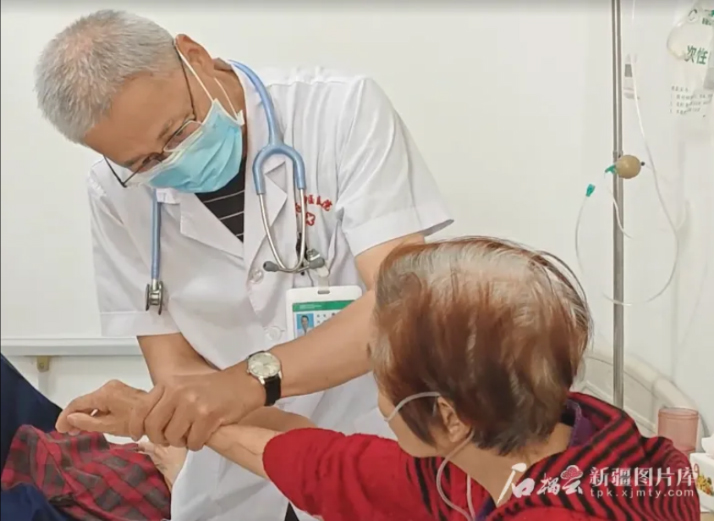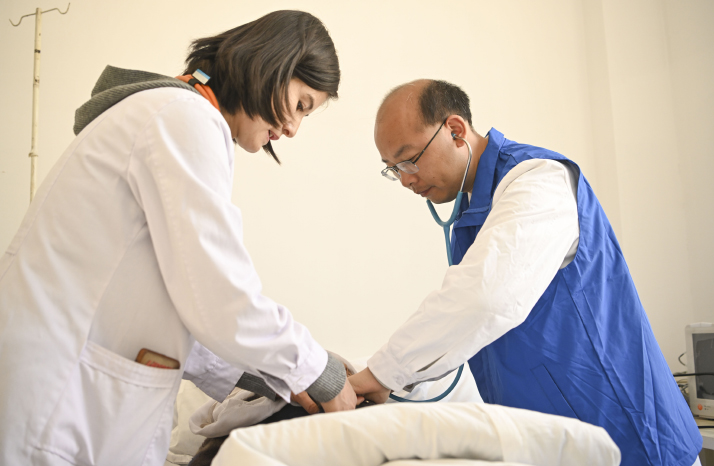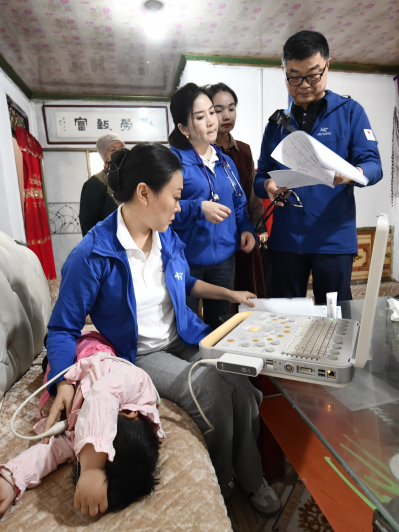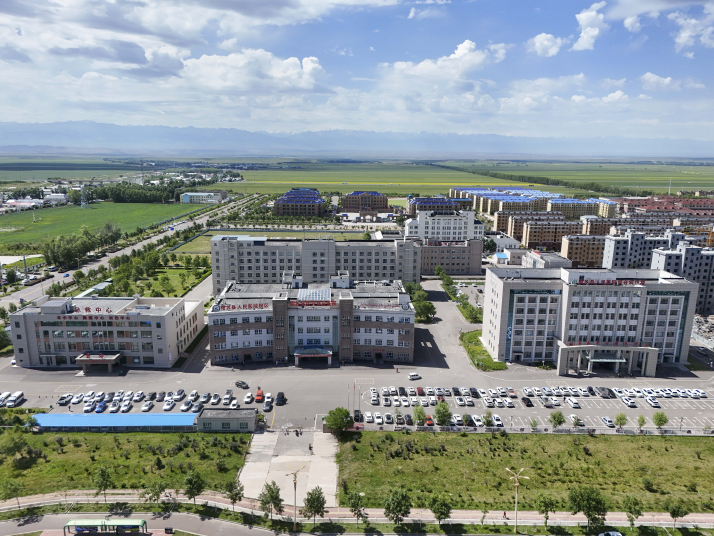| Xinjiang Today |
| Ancient medical wisdom revitalized to boost health | |
|
|
 Li Fengseng, a doctor at the Fourth Affiliated Hospital of Xinjiang Medical University (Xinjiang Uygur Autonomous Region Hospital of Traditional Chinese Medicine), treats a patient on June 5 (SU LUPING)
I began my medical education at Xinjiang Traditional Chinese Medicine College in 1982. The institution later merged with Xinjiang Medical College in 1998 to form Xinjiang Medical University (XJMU). By my third year in the college, clinical work had sparked in me a deep passion for traditional Chinese medicine (TCM)—and a resolve to become a true healer. In 1988, I joined the hospital affiliated to my college, which is now known as XJMU's Fourth Affiliated Hospital. In the hospital, I observed various types of respiratory diseases—especially chronic obstructive pulmonary disease (COPD), asthma and tuberculosis. Later, with institutional support, I enrolled in advanced studies at the Shanghai University of Traditional Chinese Medicine, completing a master's program in integrative respiratory medicine. I then continued my education at Shanghai First People's Hospital and earned a doctorate. Upon returning from advanced study in Shanghai, I founded Xinjiang's first Class-A tertiary respiratory department integrating Chinese and Western medicine—the region's only such specialty department at the time. The department has since developed recognized strengths in managing complex respiratory illnesses through combined therapies.  A doctor from Shenzhen, Guangdong Province, on a Xinjiang assistance mission, works with his local counterpart in Tashikuergan (Taxkorgan or Tashkurgan) Tajik Autonomous County, Kashi Prefecture, on March 24 (XINHUA)
In December 2008, the National Development and Reform Commission and the National Administration of Traditional Chinese Medicine launched the National TCM Clinical Research Base Program—a landmark effort to tackle major intractable diseases and boost innovation in traditional medicine. It marked the most significant government investment and national focus on the field since the founding of the People's Republic of China in 1949. Our hospital was among the institutions participating in the program, with COPD as its primary research focus. Under the program's support, our respiratory department expanded from one unit to five and evolved into a Respiratory and Critical Care Center. We established a regional specialty alliance across Xinjiang and became the largest and most advanced respiratory department among all TCM hospitals nationwide, significantly enhancing the respiratory care in the region. Today, the department draws patients from across Xinjiang, other provinces, and even neighboring countries, serving around 100,000 outpatients and admitting over 11,000 inpatients annually.  Doctors from DeltaHealth Hospital Shanghai examine a child who had undergone a congenital heart disease operation at their hospital, at her home in Maigaiti (Markit) County, Kashi (Kashgar) Prefecture, on April 8 (XINHUA)
Teaching and mentoring As a physician and a teacher, I am committed to helping cultivate a new generation of clinical doctors for Xinjiang—professionals who are capable, dependable and willing to stay and serve. The students are held to high standards—they are required to not only have solid clinical skills, but also a compassionate heart, respect and understanding. In research, I encourage them to focus on high-incidence respiratory diseases in Xinjiang, sharpen their clinical skills, and develop the ability to carry out research to tackle practical problems. Supported by Xinjiang's well-established training system spanning undergraduate to doctoral education, our locally cultivated talents now stand on a much stronger footing. To date, 80 of my students have earned a master's degree and over 20 a doctoral degree, while several more are still studying for their degrees. More than 90 percent of these graduates have found employment in Xinjiang, committed to safeguarding the health of the people here. To secure the future of grassroots TCM practitioners, Xinjiang has built a lifelong education system that seamlessly connects undergraduate, postgraduate and continuing education. In 2022, I was appointed as a mentor in the national program for disseminating the academic expertise of senior TCM practitioners. Two students were officially named as my academic successors. Through hands-on mentoring—ranging from bedside observation and independent clinical practice to in-depth study of classical texts—I helped them consolidate their theoretical grounding and strengthen their practical skills. On this foundation, they began to offer original insights, carrying forward and building upon my academic expertise. What gratifies me most is that after years of dedicated guidance, they have become both highly skilled practitioners and pillars in their respective specialties. They now lead their own teams in serving grassroots communities with commitment and compassion, delivering real benefits to the people.  A bird's-eye view of the Zhaosu County People's Hospital on July 4, after renovation funded by Taizhou, Jiangsu Province (XINHUA)
Achievements in scientific research In 2023, I received Xinjiang's Award for Outstanding Contribution in Science and Technology. This honor recognizes those who have devoted themselves selflessly to advancing healthcare in Xinjiang through innovation. Promoting and innovating TCM has been a development priority in Xinjiang. Confronted with limited resources and a shortage of specialized talent, we rose to the challenge by establishing Xinjiang's first research team focused on high-prevalence respiratory diseases through the integration of TCM and Western medicine—filling a regional gap and reaching nationally advanced standards in diagnosing and treating both common and complex conditions. We also created the region's first key laboratory and clinical research center for respiratory diseases, overcoming long-standing barriers in research infrastructure. To further strengthen grassroots healthcare, we built a TCM translational collaboration network that facilitates remote consultations and local capacity building. Over the past three decades, I have led my team in shaping a distinctive academic framework for diagnosing and treating pulmonary diseases with characteristics specific to northwest China. We have also developed tailored TCM protocols for major respiratory conditions. We have conducted interdisciplinary research into the pathogenesis of pulmonary disorders grounded in classical theories. We were also among the first to identify distinct phenotypes of COPD with fast and slow progression, offering key insights that have elevated the standard of respiratory care in Xinjiang. Our team has secured four national invention patents and led the development of three industry standards. We have created two distinctive TCM therapies for COPD and received approval for eight medicines, including the Yiqi Gubiao Pill, a TCM formula to treat COPD and lung cancer that has already been successfully commercialized. Currently, we are conducting research into the pathogenesis of COPD and asthma while advancing the development of TCM-based approaches for their prevention and treatment. TCM is embracing a historic opportunity for revitalization. National-level policies continue to provide strong support, while Xinjiang has launched major initiatives to build a service system tailored to regional needs. The promulgation of the Regulations on TCM Medicine in the Xinjiang Uygur Autonomous Region has not only established a legal foundation for TCM inheritance and innovation, but also unlocked growth momentum through supportive measures such as insurance coverage and talent development. These institutional advances are now powering our scientific research. Standing at a new starting point, we look to the future with confidence and determination. The author is a doctor at the Fourth Affiliated Hospital of Xinjiang Medical University (Xinjiang Uygur Autonomous Region Hospital of Traditional Chinese Medicine Comments to yanwei@cicgamericas.com |
|
||||||||||||||||||||||||||||
|